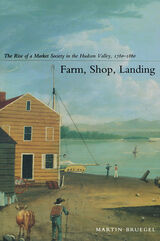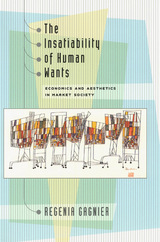3 books about Market Society

Farm, Shop, Landing
The Rise of a Market Society in the Hudson Valley, 1780–1860
Martin Bruegel
Duke University Press, 2002
At the turn of the nineteenth century, when the word “capital” first found its way into the vocabulary of mid-Hudson Valley residents, the term irrevocably marked the profound change that had transformed the region from an inward-looking, rural community into a participant in an emerging market economy. In Farm, Shop, Landing Martin Bruegel turns his attention to the daily lives of merchants, artisans, and farmers who lived and worked along the Hudson River in the decades following the American Revolution to explain how the seeds of capitalism were spread on rural U.S. soil.
Combining theoretical rigor with extensive archival research, Bruegel’s account diverges from other historiographies of nineteenth-century economic development. It challenges the assumption that the coexistence of long-distance trade, private property, and entrepreneurial activity lead to one inescapable outcome: a market economy either wholeheartedly embraced or entirely rejected by its members. When Bruegel tells the story of farmer William Coventry struggling in the face of bad harvests, widow Mary Livingston battling her tenants, blacksmith Samuel Fowks perfecting the cast-iron plough, and Hannah Bushnell sending her butter to market, Bruegel shows that the social conventions of a particular community, and the real struggles and hopes of individuals, actively mold the evolving economic order. Ultimately, then, Farm, Shop, Landing suggests that the process of modernization must be understood as the result of the simultaneous and often contentious interplay of social and economic spheres.
Combining theoretical rigor with extensive archival research, Bruegel’s account diverges from other historiographies of nineteenth-century economic development. It challenges the assumption that the coexistence of long-distance trade, private property, and entrepreneurial activity lead to one inescapable outcome: a market economy either wholeheartedly embraced or entirely rejected by its members. When Bruegel tells the story of farmer William Coventry struggling in the face of bad harvests, widow Mary Livingston battling her tenants, blacksmith Samuel Fowks perfecting the cast-iron plough, and Hannah Bushnell sending her butter to market, Bruegel shows that the social conventions of a particular community, and the real struggles and hopes of individuals, actively mold the evolving economic order. Ultimately, then, Farm, Shop, Landing suggests that the process of modernization must be understood as the result of the simultaneous and often contentious interplay of social and economic spheres.
[more]

The Insatiability of Human Wants
Economics and Aesthetics in Market Society
Regenia Gagnier
University of Chicago Press, 2000
What is the relationship between our conception of humans as producers or creators; as consumers of taste and pleasure; and as creators of value? Combining cultural history, economics, and literary criticism, Regenia Gagnier's new work traces the parallel development of economic and aesthetic theory, offering a shrewd reading of humans as workers and wanters, born of labor and desire.
The Insatiability of Human Wants begins during a key transitional moment in aesthetic and economic theory, 1871, when both disciplines underwent a turn from production to consumption models. In economics, an emphasis on the theory of value and the social relations between land, labor, and capital gave way to more individualistic models of consumerism. Similarly, in aesthetics, theories of artistic production or creativity soon bowed to models of taste, pleasure, and reception.
Using these developments as a point of departure, Gagnier deftly traces the shift in Western thought from models of production to consumption. From its exploration of early market logic and Kantian thought to its look at the aestheticization of homelessness and our own market boom, The Insatiability of Human Wants invites us to contemplate alternative interpretations of economics, aesthetics, and history itself.
The Insatiability of Human Wants begins during a key transitional moment in aesthetic and economic theory, 1871, when both disciplines underwent a turn from production to consumption models. In economics, an emphasis on the theory of value and the social relations between land, labor, and capital gave way to more individualistic models of consumerism. Similarly, in aesthetics, theories of artistic production or creativity soon bowed to models of taste, pleasure, and reception.
Using these developments as a point of departure, Gagnier deftly traces the shift in Western thought from models of production to consumption. From its exploration of early market logic and Kantian thought to its look at the aestheticization of homelessness and our own market boom, The Insatiability of Human Wants invites us to contemplate alternative interpretations of economics, aesthetics, and history itself.
[more]

Rival Views of Market Society and Other Recent Essays
Albert O. Hirschman
Harvard University Press, 1992
Since the mid-twentieth century Albert O. Hirschman has been known for his innovative, lucid, and brilliantly argued contributions to economics, the history of ideas, and the social sciences. Two central and already widely admired essays in this collection explore new territory. The title essay distinguishes among four very different conceptions of the characteristics and dynamics of capitalist societies. A related plea for embracing complexity is made in “Against Parsimony,” a wide-ranging critique of traditional economic models. In other writings Hirschman revisits his own views on economic development, the concept of interest, and the roles of “exit” and “voice” in economic and social systems. This volume reaffirms the powerful originality and enduring value of Hirschman’s work.
[more]
READERS
Browse our collection.
PUBLISHERS
See BiblioVault's publisher services.
STUDENT SERVICES
Files for college accessibility offices.
UChicago Accessibility Resources
home | accessibility | search | about | contact us
BiblioVault ® 2001 - 2024
The University of Chicago Press









